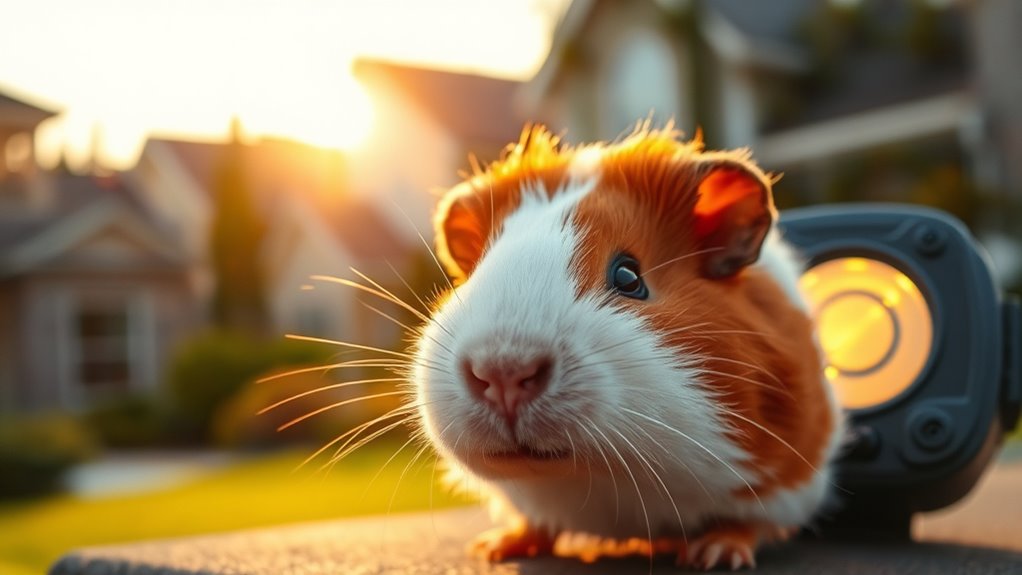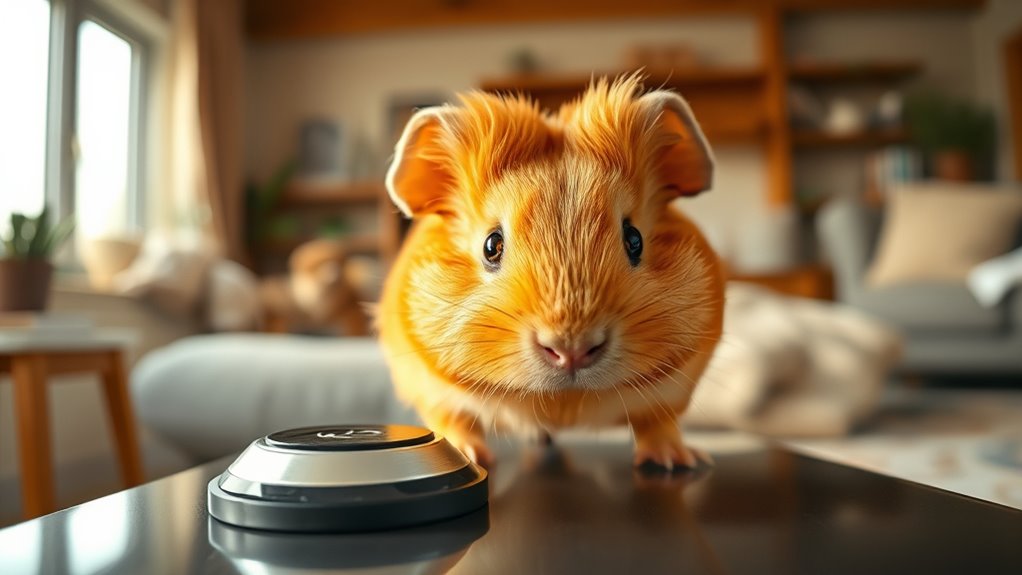Imagine your guinea pig sensing a gas leak before any alarm sounds. Thanks to their sharp sense of smell, they detect subtle changes in air quality and often react with agitation, squeaking, or pacing. These behaviors can serve as natural warnings that something’s wrong, potentially saving your neighborhood from disaster. Staying attentive to your pet’s signals can help protect everyone around you. Keep exploring to discover how animals’ instincts can be your first line of safety.
Key Takeaways
- Guinea pigs’ acute sense of smell enables them to detect dangerous gas leaks early.
- Sudden agitation, squeaking, or restlessness in guinea pigs can signal hazardous environmental changes.
- Pet owners who observe unusual guinea pig behavior can respond promptly to potential gas leaks.
- Combining guinea pig reactions with gas detectors enhances household safety measures.
- Recognizing animal signals can prevent disasters, as demonstrated by guinea pigs alerting neighbors to a gas leak.

When a gas leak occurs, early detection can prevent disaster, and surprisingly, a tiny guinea pig has proven to be an unlikely but effective hero. You might think that gas leaks are only detectable by professional sensors or smell, but in this case, animal instincts played a vital role. This small creature’s natural sensitivity to environmental changes made all the difference. Your safety awareness can be heightened by understanding how animals, especially pets, subconsciously respond to dangers in their surroundings.
Guinea pigs, like many small animals, have acute senses that far surpass human capabilities in some aspects. Their sense of smell and hearing are highly developed, allowing them to pick up on subtle changes in air quality or unusual sounds. When the gas started to leak, the guinea pig exhibited restlessness, squeaking loudly and pacing near a specific corner of the house. These instinctive reactions weren’t random—they were signs of heightened alertness to something abnormal in the environment. Recognizing these signals can be vital for homeowners who might overlook the early signs of a leak.
Small animals like guinea pigs can detect gas leaks early through their heightened senses and alert behaviors.
Your safety awareness is key here. You should always pay attention to your pets’ behavior, especially if they act unusually without any clear reason. In this case, the guinea pig’s agitation prompted the homeowner to investigate further, leading to the discovery of the gas leak before it could cause harm. If you’re aware of animal instincts and how they respond to potential dangers, you’re more likely to react promptly and prevent a crisis. It’s a reminder that animals can serve as natural early warning systems, even if we often dismiss their reactions as mere quirks.
This incident highlights the importance of understanding animal behavior and respecting their instincts. While modern technology provides advanced detection tools, the natural instincts of animals remain an invaluable asset in ensuring safety. Your awareness of this can motivate you to observe your pets carefully and maintain safety precautions, such as installing gas detectors and ensuring proper ventilation. Additionally, understanding animal senses can help you better interpret their reactions and respond appropriately.
In essence, trusting your pets’ instincts and being vigilant about changes in their behavior can help you identify hazards early on. The guinea pig’s reaction was a small but powerful reminder that sometimes, nature’s smallest creatures can be the most effective guardians. Your heightened safety awareness, combined with an understanding of animal instincts, can make all the difference in preventing accidents and protecting your loved ones.
Frequently Asked Questions
How Was the Guinea Pig Trained to Detect Gas Leaks?
You might wonder how a guinea pig is trained to detect gas leaks. Using training techniques like positive reinforcement, you encourage your guinea pig to associate specific behavioral cues with the scent of gas. You observe its reactions closely, rewarding it when it shows interest or alertness. Over time, these behavioral cues become clear signals, enabling your guinea pig to alert you to dangerous leaks reliably.
What Specific Gas Was the Guinea Pig Able to Detect?
You might wonder what specific gas this animal detects. In gas detection and animal training, the guinea pig was trained to recognize propane, methane, and natural gas leaks. Its keen sense of smell helps it alert you to dangerous fumes, providing early warning and ensuring safety. This remarkable ability showcases how animal training leverages natural instincts for essential detection tasks, making it an invaluable part of safety measures.
How Sensitive Is the Guinea Pig’s Detection Compared to Sensors?
You might wonder how sensitive guinea pigs are compared to sensors. Their detection thresholds are surprisingly low, often matching or exceeding sensor accuracy in detecting gas leaks. While sensors are calibrated for precision, guinea pigs rely on their natural instincts and olfactory senses, allowing them to notice even faint traces of dangerous gases. This makes them highly effective, especially in early detection situations where sensor response might lag.
Were There Any Health Risks to the Guinea Pig During Detection?
Coincidentally, when considering animal safety and health considerations, you realize the guinea pig faced minimal health risks during detection. The environment was carefully monitored to guarantee safe gas levels, preventing stress or harm to the animal. Proper precautions, such as limiting exposure time and providing a safe space, helped protect your guinea pig’s well-being. You can trust that, with careful oversight, the animal contributed effectively without compromising its health.
Can Other Animals Be Trained to Detect Gas Leaks Similarly?
You might wonder if other animals can be trained to detect gas leaks like the guinea pig. Animal intelligence varies, affecting their ability to learn detection methods. Dogs, for example, have highly developed olfactory senses and are already trained for various detection tasks, making them excellent candidates. With proper training, many animals could potentially be taught to detect gas leaks, leveraging their natural abilities for safety and early warning systems.
Conclusion
Just like the legendary canary in the coal mine, your tiny guinea pig proved that even the smallest creature can make a big difference. By sensing danger before it strikes, you’re reminded that vigilance comes in all sizes. Remember, every hero starts with a simple act—sometimes, it’s a little fluffball’s alert that saves the day. So, keep appreciating those unlikely guardians; they might just be your neighborhood’s silent protectors, echoing the wisdom of old stories.










